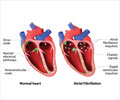Widowers (men who have lost their spouse) who suffer a heart attack are 11 per cent more likely to die than widows (women who have lost their spouse).

‘Surviving some of the most common heart and circulatory diseases may be impacted by your gender and marital status. ’





The new research from Aston University, Birmingham, has found stark differences in the death rates of men and women, particularly in relation to marital status, when living with heart failure, atrial fibrillation (AF) or following a heart attack. Widowers (men who have lost their spouse) who suffer a heart attack are 11 per cent more likely to die than widows (women who have lost their spouse).
Similar findings were found amongst widowed men with heart failure (10 per cent) and AF (13 per cent) compared to widowed women with the same conditions. Divorced men with AF were 14 per cent more likely to die than divorced women.
The situation is quite different for those who aren't married. The team discovered that single men with heart failure actually had a 13 per cent lower risk of death compared to single women. This study follows on from previous work suggesting that being married may improve the chances of surviving a heart attack, and this is particularly the case for women (2-4).
By studying 1,816,230 people?who were admitted to hospitals in the North of England with a heart attack, heart failure or AF between 2000 and 2014, the researchers were able to see how marital status or gender may affect the long term risk of dying from these life threatening conditions over a 14 year period. Data were analysed according to the ACALM (Algorithm for Comorbidities, Associations, Length of stay and Mortality) study protocol.
Advertisement
"When it comes to helping people recover from a life-threatening heart condition, focusing solely on their medical problem does not necessarily give the best outcome. It's important we look into providing holistic care and explore other factors, such as their support network, which can also have a big impact on a person's health."
Advertisement
"Nobody should feel they have to face their condition alone. Regardless of your marital status, whether you are a man or woman, it's important to know that there is an abundance of support out there for you. If you are not able to or don't feel comfortable calling on friends and family, you can also speak to your GP or the BHF's?Heart Helpline?for advice and support." Dr Ranjit More, Consultant Cardiologist at Blackpool Teaching Hospitals NHS Trust and co-author said:
"These gender differences we are seeing could be due to men and women having different levels of support, or willingness to seek support. By identifying which groups of people have the worst outcomes, we can then push for healthcare professionals to encourage those people to become involved in group therapy and ensure they have adequate support networks in place to help deal with these serious, chronic medical conditions."
Source-Eurekalert













